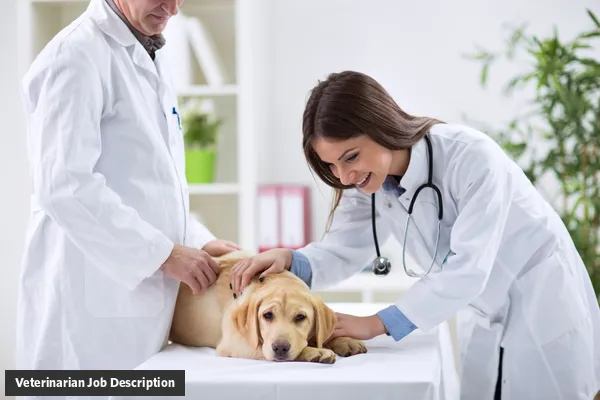Veterinarian Job Description Template
Use this Veterinarian job description template to advertise the open roles for free using Longlist.io. You can use this template as a starting point, modify the requirements according the needs of your organization or the client you are hiring for.

Job Brief
We are looking for a Veterinarian to diagnose and treat our clients’ animals. Our clinic specializes in dogs, cats and occasionally smaller animals.
Responsibilities
- Examine animals and check their health status
- Diagnose illnesses and determine the best treatment
- Dress wounds of injured animals
- Perform dental, ophthalmic and orthopedic surgeries
- Vaccinate animals to prevent diseases
- Spay and neuter cats and dogs as needed
- Prescribe medication
- Advise pet owners on nutrition, preventive healthcare and general care
- Conduct home visits occasionally, in case of emergency
- Update client records
Requirements
- Work experience as a Veterinarian, Veterinary Technician or Veterinarian Assistant
- Experience conducting various types of surgeries, vaccinations and health checks on animals
- Knowledge of medical equipment (e.g. X-ray machines) and anesthesia procedures
- Problem-solving skills
- Excellent communication skills with the ability to explain medical terms and conditions using simple language
- Availability to take evening or weekend shifts in cases of emergency
- Patience and a love for animals
- Doctor of Veterinary Medicine (DVM) degree
What does Veterinarian do?
A veterinarian's day-to-day responsibilities may vary depending on the type of practice they work in, but here are some common tasks they might undertake:
-
Examining and diagnosing animals: Veterinarians evaluate the overall health of animals by conducting physical examinations, observing behavior, and listening to owners' concerns. They diagnose illnesses and injuries and develop treatment plans accordingly.
-
Treating and performing surgeries: Veterinarians administer medication, vaccines, and treatments to animals, as well as perform surgeries when necessary. They may also provide dental care, perform ultrasounds, and other specialized procedures.
-
Preventive care: Veterinarians play a crucial role in promoting preventive care for animals. This involves administering vaccinations, providing parasite prevention, and educating owners about proper nutrition, exercise, and maintenance routines.
-
Consultations and communication: Veterinarians communicate with pet owners to discuss diagnoses, treatment plans, and offer advice and guidance on pet care. They answer questions and provide information about nutrition, behavior, and overall wellness.
-
Record-keeping and documentation: Veterinarians maintain detailed medical records of their patients, including examination findings, diagnosis, treatments, and other relevant information. This helps them track an animal's progress and communicate with other veterinary professionals if necessary.
-
Collaborating with a team: Veterinarians often work alongside veterinary technicians, assistants, and other support staff. They delegate tasks, oversee procedures, and collaborate to ensure the smooth operation of the clinic or hospital.
-
Emergency care: Veterinarians may provide emergency care to injured or critically ill animals, which often involves rapid assessment, stabilization, and treatment.
-
Continuing education: To stay up-to-date with the latest advancements in veterinary medicine, veterinarians frequently participate in continuing education programs, conferences, and workshops.
It's important to note that this is a general overview, as some veterinarians specialize in areas like small animal medicine, large animal medicine, exotic pets, research, or public health.
